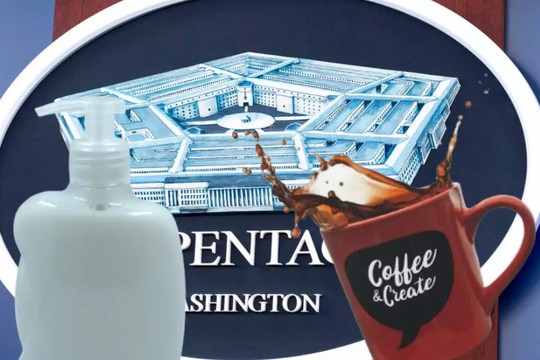Pic.: timesnownews.com
President Donald Trump's team of zealous cost-cutters under Elon Musk will soon set their sights on the U.S.’s largest discretionary budget, FOX News reports.
With an annual budget of $850 billion, the Pentagon has long been plagued by accusations of waste and inefficiency in its defense programs and recently failed its seventh straight audit.
"We’re going to find billions, hundreds of millions of dollars of fraud and abuse," Trump predicted in an interview with Fox News' Bret Baier on Sunday.
Congress appropriates the Department of Defense (DOD) budget each year in great detail, and urging lawmakers to trim costs may be where Republicans publicly break with Musk and his burn-it-all-down style.
President Donald Trump’s team of cost-cutting gurus under Elon Musk will soon set their sights on the U.S.’s largest discretionary budget.
The inclination of Musk and his team seems to be to cull federal employees, but cost-cutting advocates argue that outsourcing work to contractors could have the opposite effect.
Typically, around half the Pentagon’s budget goes to contractors, corporations that have a profit motive unlike the government itself. The government relies on contractors for software support, training, weapons and to act as paramilitary forces in foreign missions.
The report found the Pentagon was paying an eye-watering 1,014,000 contractors to fill back-office jobs far away from the front lines. The DOD currently only lists around 1.3 million active duty troops.
In October 2024, a two-year audit by the Defense Department Inspector General found Boeing overcharged the Air Force by 8,000% for soap dispensers that the service branch paid $149,072 over market price for. Of a selected 46 spare parts that were scrutinized by the audit, the report found the Air Force overpaid about $1 million for 12 of them for its C-17 transport planes.
That followed a 2018 congressional inquiry that revealed the Air Force was spending $1,300 for each reheatable coffee cup on its KC-10 aircraft – and then replacing them instead of repairing them when their handles broke. Sen. Chuck Grassley, R-Iowa, found the Air Force spent $32,000 replacing 25 cups.
Musk has suggested that he will look to eliminate the F-35 stealth fighter jet program, long dogged by cost overruns, glitches and delays. In posts, he called it the "the worst military value for money in history," and the jet itself "an expensive & complex jack of all trades, master of none" and added that "manned fighter jets are obsolete in the age of drones anyway."
However, doing away with the F-35 has run into opposition in Congress every time it has been suggested.
Elon Musk has suggested that he will look to eliminate the F-35 stealth fighter jet program, long dogged by cost overruns, glitches and delays.
Halting the F-35 fighter jet program, dogged by cost overruns, glitches and delays, as some have advocated for, would trim $12 billion per year, according to the joint report.
But Congress would need to get on board with defunding the F-35 in its yearly defense bill, and Lockheed Martin produces the plane's parts in many states across the country, where lawmakers have constituents with jobs at risk.
The report found that eliminating the Sentinel ICBM program would save $3.7 billion per year.
The Stimson report found that "targeted closures and realignments" of U.S. military bases could save another $3-5 billion per year.
"Even if say I accept all the missions we have now in the world, you could probably cut some overseas bases without even really rethinking strategy," said Ben Friedman, policy director at Defense Priorities.
"If you accept that we're trying to manage the Middle East through US military troop presence or at least the ability to deploy troops and say, okay, we could do with fewer bases."
The Trump team is reportedly considering shutting down its presence in Syria, where 2,000 troops are currently stationed.
Cost-cutting initiatives will face opposition from a Congress that has never been keen to take a scalpel to the nation's defenses.
"If history is any kind of precedent, I do think that this is where you'll start to see at least a real sort of tension arise," said Diana Shaw, former State Department Inspector General. "There are a lot of vested interests, and not just economic."
"There are folks with philosophical interests in the entire defense infrastructure and the military. And so, this is an area that has been well protected historically. And so I do think this now will be an interesting test case to see whether there will be, even within the Republican Party now, some pushback to the sort of aggressive cutting and picking apart that we've seen happen at other agencies that have historically been sort of less favored by members of the Republican Party."
read more in our Telegram-channel https://t.me/The_International_Affairs

 9:55 18.02.2025 •
9:55 18.02.2025 •























